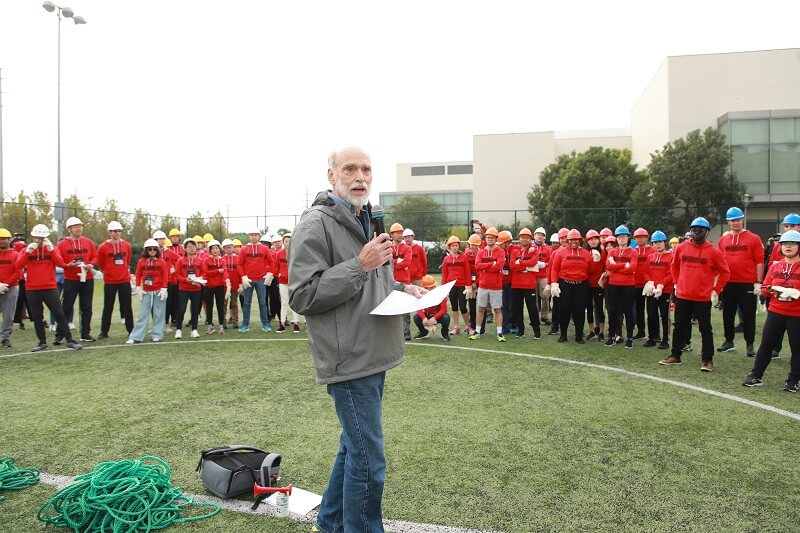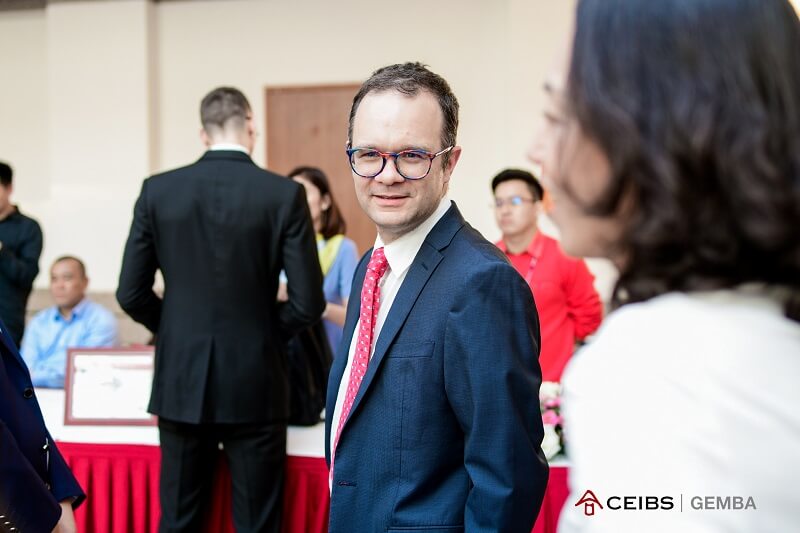Google search traffic for ‘leading through a crisis’ shot up in March 2020. The coronavirus pandemic hit and managers worldwide were suddenly faced with a severe challenge to their businesses. How do you manage through troubling times and come out of the other side with minimal collateral damage?
Executive leadership skills play a vital role in the ability of a company to navigate choppy waters. On the China Europe International Business School (CEIBS) Global Executive MBA (GEMBA), an eight-day leadership module at the start of the program prepares executives to do just that.
Led by leadership professor, Jack Denfeld Wood, the module brings together around 35 executive coaches from around the world. Each student is assigned a coach for the duration of the module.
The module consists of one on one coaching sessions, peer to peer learning and feedback, and a challenging outdoor group and problem-solving exercise about which candidates are sworn to secrecy.
Executive students are filmed throughout the exercises too. Footage is used by the coaches, groups, and individuals to analyze the dynamics of leadership, and how they actually are perceived by themselves and others in their exercise of leadership.
The eight-day opening module forms the foundation for the Global Executive MBA, where participants will constantly be developing their leadership skills throughout the 20-month program.
During the subsequent modules—whether it’s finance, accounting, operations, marketing—whatever the subject, leadership will be happening. So, the foundation of the learning is clarity on leadership: how groups work and how you work in a group.
Developing leadership skills
‘I hear and I forget, I see and I remember, I do and I understand’. Jack began a recent webinar on leadership in disruptive times by quoting Chinese philosopher Xun Zi. That quote forms the basis of what he’s trying to achieve on the GEMBA leadership module.
Learning is split into active or passive, he said. Passive learning encompasses learning from a lecture, reading something, audio visual, or demonstrations. From each of these we respectively retain around 5%, 10%, 20%, and 30%.
We have a much stronger retention rate when it comes to active learning, which involves working together and group discussion, physically practicing what we’re taught, and teaching others. With this method of learning we respectively retain around 50%, 75%, and 90%.
In the mornings of the leadership module students are given a conceptual framework and in the afternoon their learning is experiential, integrating in practice the cognitive learning from the morning sessions.
Students become familiar with their leadership by observing themselves in a leadership setting and getting feedback from colleagues and professional coaches. How do they react to others? How do others react to them?
“Leadership is essentially getting a group from A to B,” explained Jack. “In order to do that you need to have [the people around you] emotionally engaged.
“On the GEMBA program, we try to combine rational frameworks and emotional experience so we’re more integrated. If we are not able to integrate our thinking and feeling, we become fragmented and anxious, and search for simple and reassuring answers to complex questions offered by those who appear to be leading but are essentially simply dominant—which appears to be what’s happening in the world [just now].”
He added that leadership is fundamentally done in small groups and cited a study he conducted with the British Military at RMA Sandhurst. When they select officers from Sandhurst, the ones who are selected, Jack said, aren’t those who are dominant and bossy, but rather those who listen to everyone else and synthesize a solution for the whole group to accomplish their given task. In that sense, leading and following is a fluid process. And the formal leader may not be the one who is leading at a particular moment.
Leading through a crisis
Companies can find themselves in trouble when the rate of change outside exceeds the rate of change inside. If that happens ‘the end is in sight’, according to former CEO of General Electric, Jack Welch.
Jack Wood suggests that the inability to respond to changes applies to individuals as well as organizations. And that it’s essential to identify the implications of one’s initiatives. That is, which changes will be helpful, and which will be unhelpful.
When people come to the GEMBA program, said Jack, they’re looking for tools. They’ll come in asking what tools they can use next week with their team when they return to work.
But tools are simply made of metal and do something to someone or something—things like saws and hammers. Much more important are instruments—things that measure, like microscopes and telescopes. As far as exercising leadership goes, you are the best instrument you have for bringing a group, department, or organization forward.
“Paying attention to how you feel or what you experience, asking what is happening to me and those around me, that’s using yourself as an instrument. That’s a more effective way to exercise leadership, particularly in disruptive times, than ordering people around.”
One implication of the coronavirus pandemic is that workplaces and workforce collaboration haven’t just been put under strain, but the whole idea of work and home have collapsed and coalesced into one.
Some people may discover that whereas before they were an executive at work, now they’re a teacher at home for their kids. “You could find yourself in a place where you were anticipating you would be in one role and you’ve found yourself in another, and that can tend to be disturbing.”
There is a different ‘you’ at home and at work, with different vocabularies, different emotional repertoires. The quarantine forces us to become more aware of these different selves.
Understanding what happens when things change on this level and tapping into the changes emotionally is an essential part of the learning on the leadership module. The frameworks students are exposed to prepare them to lead responsibly through disruptive times.
The results of executive leadership training
Jessie Lian (pictured right) is a 2015 GEMBA graduate and currently the general manager for China and VP of marketing and BD in the APAC region for Cardinal Health, a healthcare services company. Olivier Brault started the program last year and is currently the APAC General Manager for Soprema, a leading roofing and insulation company. Both completed Jack Wood’s leadership course.
Olivier (pictured below) explained on the webinar that coronavirus has pushed to the fore the practical use of leadership both in the ‘office’ and at home. “When we live it, this is how we realize how everything we learned clicks together,” he said.
When the virus first shut down areas of China in January, a lot of Olivier’s team were in their hometowns for Chinese New Year. He realized the first mistake of many leaders is to just try and reassure everybody when there’s a crisis—his team wanted action.
This was a few days after they had begun to build a hospital in Leishenshan—which would be completed in under two weeks—and Olivier launched the idea to be the company that built the hospital’s roof.
His team mobilized their digital communication, called contractors, and organized the logistics. Three days later they were talking to a construction company in Wuhan.
By moving the team quickly, the inertia was removed. Everybody was really proud, he explained, and the project was portrayed as bringing the country together.
He puts his decision-making ability down to some of the memorable situational awareness exercises on the leadership module. “I’m very glad I took this class a few months before because my time of reaction was so much faster, because I was properly trained.”
Jessie echoed Olivier’s sentiments, explaining that her company had to quickly mobilize to deliver PPE to clients and to work safely with physiologists working in hospitals in China.
The way to do that is to listen to your peers and pass the leadership torch to different members of the team when necessary, something Jack explained is integral to all great leaders.
“It was a really memorable journey,” Jessie recalled. “Everyone came to the class […] and nobody wanted to listen to the others, and everyone thought they were the smartest in the class.
“However, after this one-week journey we saw ourselves as a group and asked how we can work together with different personalities and styles of leadership. We built our relationship in the class, and it’s the most memorable module for me.”





